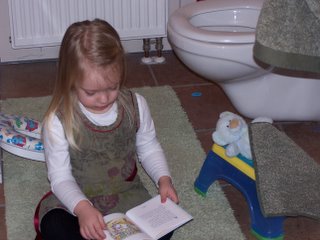
I re-read
Hinds' Feet on High Places a few weeks ago and just finished
Mountains of Spices, its follow-up.
Hinds' Feet is an allegory similar to
Pilgrim's Progress; the main character's name is Much-Afraid, and all of the characters have names representing their, well, character (Craven Fear, Bitterness, Pride, etc.).
Usually, this would be a bit...obvious? corny? preachy?...for me. I tried to read
Pilgrim's Progress some years ago and didn't even make it halfway. But something about
Hinds' Feet draws me in. I identify with Much-Afraid and her duelling desires to follow the Shepherd wherever he leads and, at the same time, to stay safe and avoid risk and pain.
One interesting point is that this book is not a conversion story. Much-Afraid is already "in service to the Shepherd" at the start of the book. The book tells the story of Much-Afraid's journey to the High Places, where the Shepherd has promised to change her twisted, crippling feet into "hinds' feet." Anyway, Much-Afraid learns many things about the nature of life, her own nature, and following the Shepherd, and eventually makes it to the High Places. So. It sounds pretty predictable, but there's a lot of wisdom packed into this allegory.
After reading it a few weeks ago (and reading several other books since then), a phrase, a concept, keeps coming back to me: "Behold your little handmaiden, Acceptance-with-Joy!" Nearly the first lesson that Much-Afraid learns is to accept hardship, suffering, and sorrow with joy, trusting that the Shepherd has a purpose for it. And her very acceptance changes the trials into something beautiful.
Acceptance with Joy. I've had to accept a few hard things in my life. Hard for
me, anyway. Plenty of people (probably most people) have harder lives than I do. But still. I have not accepted any hard thing with joy and trust. More like acceptance-with-complaining or acceptance-with-self-pity. For example, I struggled so hard with the possibility that I might not be able to have children. I remember thinking, "I'm sure I'm supposed to learn and grow through this, but I don't want to grow if it causes this much (emotional) pain!"
But we already know that a person who bears their hardships with joy and grace turns them into something beautiful. Or, more precisely, the person him/herself becomes beautiful in spirit. Christians often pray that God will heal those we know who are sick or even dying. We think, what a miracle it would be if God stepped in and healed this person. But I think that the real miracles occur when people of faith go through the most terrible suffering, through sickness or injury or (in some places) persecution or war, and yet retain their faith, and even their hope.
That is a miracle from God.
So, what do I need to accept-with-joy? Not just big things, I know. Little things, too, like a day that starts way too early because my little morning-glory bounds out of bed before 7. Like the umpteenth time I pick up the same toys or say, "Do you have to go potty? Are you sure?" Some days it seems that I have a lot to do, but none of it is very important. Just little tasks. Just the same-old, same-old.
But this acceptance-with-joy thing haunts me a bit. Do I accept with joy that my role right now is to do the small things that keep my husband and daughter happy, secure, peaceful? Do I think how tired I am as I kneel at the feet of my little one to help her put on her shoes--or do I connect that posture with Jesus washing the feet of his disciples? Do I think of repetitious chores or activities as boring, or as a routine to give me and my family a sense of security and orderliness?
And can I approach the big changes in my life the same way? I've settled in here, but I still miss a lot about living in the United States. It's easy to nurse a bad attitude when I'm feeling a bit homesick. But acceptance-with-joy says that God has a purpose in this, as in everything else. Am I willing to look for that purpose?













